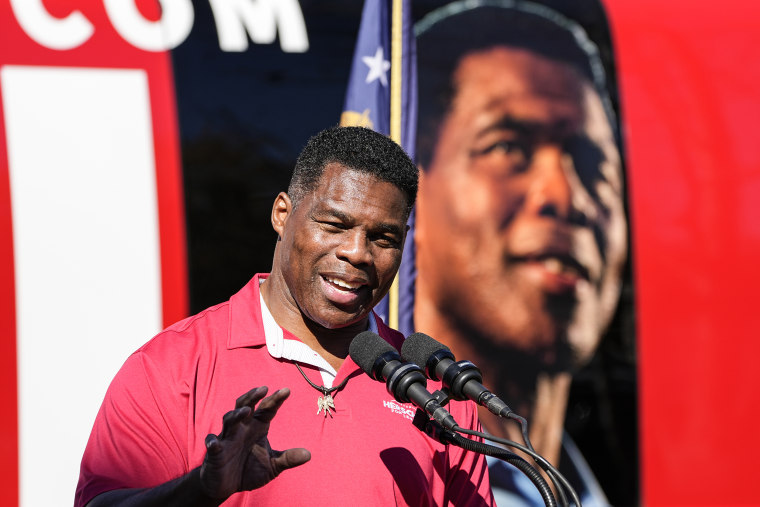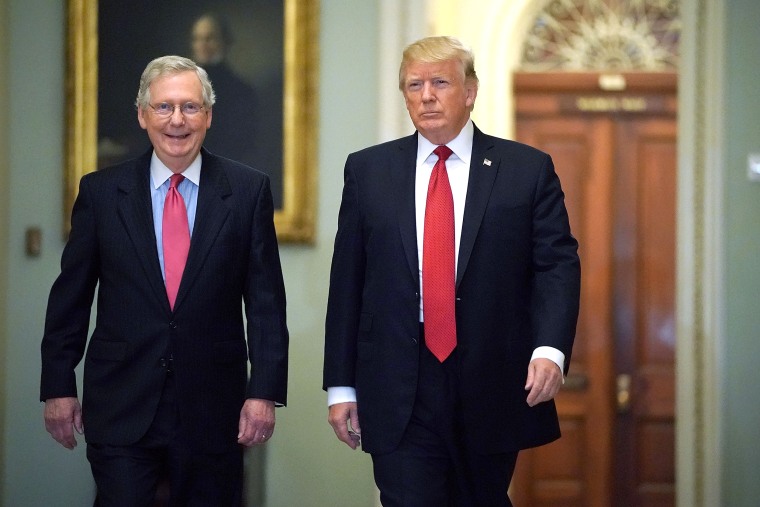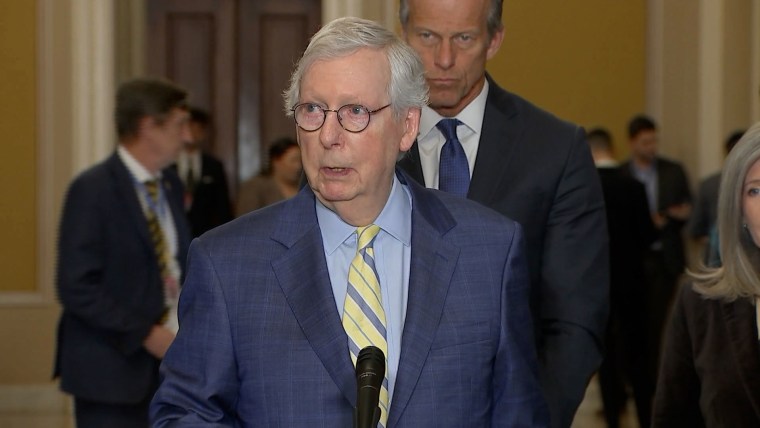[ad_1]
WASHINGTON — Senate Republican leader Mitch McConnell deferred to former President Donald Trump’s handpicked candidates in competitive midterm races, culminating in jarring defeats and a larger Democratic majority that bucked the odds.
He promises not to let that happen again, insisting he will “actively look for quality candidates” to promote in the 2024 primaries.
In a rare and pointed criticism of the former president, who’s seeking a comeback in two years, McConnell said Trump’s power is on the wane and called on him to back off Senate primaries.
“Here’s what I think has changed: I think the former president’s political clout has diminished,” McConnell told NBC News on Wednesday in a wide-ranging interview in his Capitol Hill office.
The diminished standing has made McConnell — and by extension his allies, like the deep-pocketed Senate Leadership Fund super PAC — “less inclined to accept cards that may be dealt to us,” he said.
“We can do a better job with less potential interference,” he said. “The former president may have other things to do.”
McConnell also blamed Trump for tarnishing the party’s image among crucial independent and swing voters, who rejected GOP Senate contenders in the states that decided the majority. He said that the party underperformed in “every state” — including the red state of Ohio, which Republicans narrowly won — and that its performance was “fatal” in Arizona, New Hampshire and Georgia.
“We lost support that we needed among independents and moderate Republicans, primarily related to the view they had of us as a party — largely made by the former president — that we were sort of nasty and tended toward chaos,” McConnell said. “And oddly enough, even though that subset of voters did not approve of President Biden, they didn’t have enough confidence in us in several instances to give us the majority we needed.”

McConnell’s sharp criticism raises the tension between the two GOP leaders ahead of a potentially chaotic two years for the party, which faces deep divisions over governing and political strategy as it prepares to claim control of the House and looks ahead to 2024.
A spokesman for Trump didn’t respond to a request for comment.
McConnell defended his decision not to intervene in most of the 2022 Senate primaries. He said he “looked at the landscape” and believed he had only two chances to pick favorites against flawed candidates: in Missouri, to defeat scandal-plagued Eric Greitens, and in Alabama, to stop far-right Rep. Mo Brooks.
“In the other states, Trump’s support was so significant — we could have spent a lot of money, maybe trying to come up with a different candidate and maybe not succeeding,” he said. “And so my conclusion was that everywhere else, we had to play with the cards that were dealt.”
McConnell is seeking to turn the page on a disastrous Senate cycle for the GOP and seize on various pickup opportunities to win the majority in 2024. Democrats are defending three seats in red states and five more in closely divided states. Their best hopes to flip seats are in Republican-leaning Florida and Texas. And yet, it’s Senate Majority Leader Chuck Schumer, D-N.Y. — not McConnell — who’s radiating confidence about winning the majority in 2024.
McConnell has been locked in a bitter feud with a vengeful Trump after having criticized his actions on Jan. 6, 2021 — and the relationship presents land mines for the GOP in 2024, particularly if Trump is its nominee. McConnell recognizes those land mines — he won’t endorse in the presidential primary. He has suggested Trump cannot win the nomination again, but he kept the door open to backing him in the general election if he does.
He also spent large parts of 2022 feuding over strategy with Sen. Rick Scott of Florida, the GOP Senate campaign chief. Scott rejects McConnell’s view that Trump was the problem — he argues Republicans lost because they failed to offer an agenda that inspires voters. Scott even mounted a rare challenge to McConnell for the caucus’ top job and lost.

Still, McConnell had his own role in the GOP’s underperformance this year. Using aggressive parliamentary tactics, he arguably played a larger role than anybody else in building the 6-3 conservative majority on the Supreme Court, which sparked a revolt among supporters of abortion rights when it overturned Roe v. Wade in Dobbs v. Jackson Women’s Health Organization in June.
Asked repeatedly about the role of the Dobbs decision in the GOP’s failures, McConnell expressed no regrets.
He conceded that the ruling “generated enthusiasm among Democrats, not surprisingly,” in the midterm election. But he said GOP turnout was “fine” and argued that abortion wasn’t the reason key independents and swing voters backed Democrats.
“They may have been ginned up some with their base,” McConnell said. But he insisted: “Our biggest problem was candidate quality.”
[ad_2]
Source link

